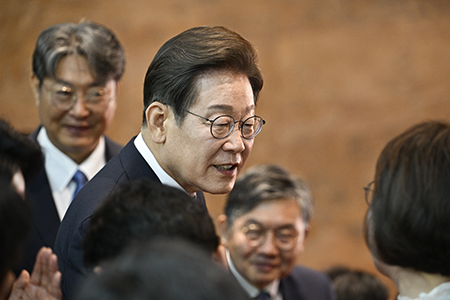"I find hope in the work of long-established groups such as the Arms Control Association...[and] I find hope in younger anti-nuclear activists and the movement around the world to formally ban the bomb."
South Korea Outlines Denuclearization Steps
September 2025
By Kelsey Davenport
South Korea’s new president outlined a three-step process for achieving the denuclearization of the Korean peninsula that would start with a freeze on North Korea’s nuclear weapons program, but Pyongyang does not appear interested in engaging with Seoul.

In an interview with Japanese newspaper Yomiuri Shimbun published Aug. 21, President Lee Jae-myung said that “simply clamoring” about denuclearization will not achieve that objective and that it is time to “actively engage” North Korea in dialogue.
To achieve denuclearization, Lee outlined a three-step process. He described a freeze in the North Korean nuclear and missile programs as the first step toward denuclearization. The second step would be to “scale” down North Korea’s current arsenal, he said, followed by the third step, which would be “complete denuclearization.” He also said that North and South Korea could mutually prosper if the two countries “recognize and respect” each other. He suggested that South Korea, Japan, and the United States should all be involved in diplomacy with North Korea.
Lee, who was elected in June, called during his campaign for de-escalating tensions with North Korea and restoring a 2018 military cooperation agreement that his predecessor abandoned as part of a more confrontational approach to North Korean provocations. Soon after taking office, Lee ordered South Korea to remove loudspeakers from the border that the previous administration used to broadcast criticisms of the North Korean regime.
Lee also appeared to acknowledge that South Korea’s approach to North Korea would account for Pyongyang’s decision to no longer seek reunification of the Korean peninsula as a long-term policy objective.
In an Aug. 15 speech, he said that South Korea must respect North Korea’s political system and said that Seoul does not seek “unification by absorption.”
Thus far, North Korea has rejected Lee’s call for rebuilding trust and engaging in dialogue.
In an Aug. 20 commentary in the state-run Korean Central News Agency, Kim Yo Jong, the sister of the country’s leader, Kim Jong Un, said that Lee continues to “tediously talk about peace and improved relations, being well aware that it is impossible to realize them.”
She said that Seoul “cannot be a diplomatic partner” for North Korea because it is “not serious, weighty, or honest” and belittled Lee.
Although Kim’s comments rejected dialogue with South Korea, she appeared to keep open the option for negotiations with the United States under the right conditions.
In July 28 remarks, Kim said that relations between U.S. President Donald Trump and her brother are “not bad” but that there will be no talks between the two countries if the U.S. goal is the dismantlement of North Korea’s nuclear weapons program. North Korea’s nuclear status is “irreversible,” she said, and the United States must recognize this status as a “prerequisite” for any future engagement.
Kim Jong Un also reiterated the country’s nuclear status during a July 29 session of North Korea’s Supreme People’s Assembly.
He said that “as long as nuclear weapons exist,” North Korea’s steps toward “strengthening nuclear power won’t stop.” North Korea will never declare its intention to denuclearize to “meet the other side’s conditions” for engagement, he said.
He made a similar comment Aug. 20 in response to U.S.-South Korean combined, joint military exercises. The exercises, which began Aug. 18, are focused on “strengthening the alliance’s response capabilities,” according to an Aug. 8 U.S. Army press release.
Kim said the military drills are a clear indication that the two countries are pursuing a “hostile and confrontational” approach to North Korea. He said that North Korea must “rapidly expand” its nuclear weapons program in response.
Although the Trump administration has said little about the details of its North Korea policy, U.S. officials have reiterated that Washington is focused on denuclearization. The White House told Fox News July 31 that Trump is open to meeting Kim again, but his objective remains the denuclearization of the Korean peninsula, a point Trump and Kim agreed to during their June 2018 summit meeting. (See ACT, July/August 2018.)
After U.S. Secretary of State Marco Rubio met with South Korean Foreign Minister Cho Hyun Aug. 14, the two officials reaffirmed the goal of “complete denuclearization” of North Korea and the importance of enforcing sanctions on the country.
Cho said that Trump’s leadership is “essential” to creating new opportunities with North Korea and that he expects “something to come out of President Trump’s leadership.”
But he acknowledged that the conflicting positions on denuclearization will require “a lot of back and forth” before there is a breakthrough.
